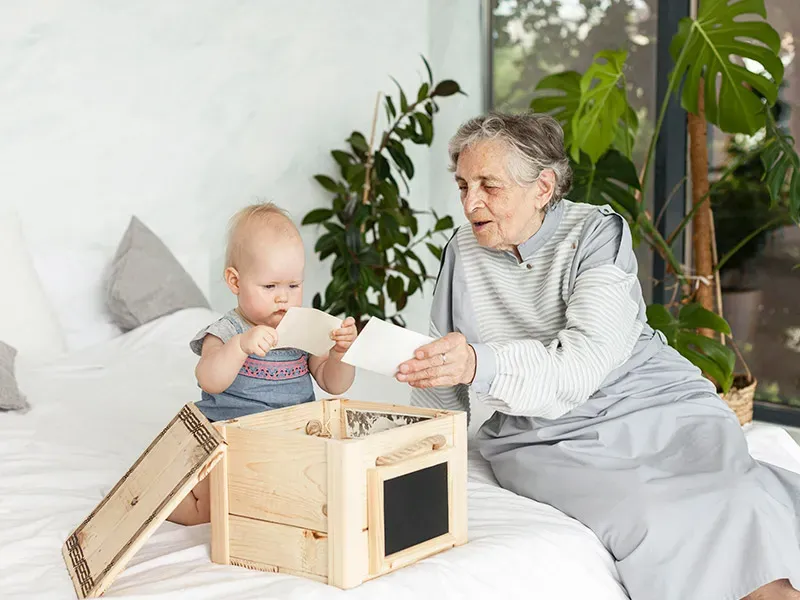The Pros and Cons of Grandparents Babysitting

When weighing childcare options, understanding the pros and cons of grandparents babysitting becomes crucial for making an informed decision. With childcare costs continuing to rise, many families turn to grandparents as their primary caregivers. Let's explore the five key benefits and five important challenges of this arrangement.
Understanding Modern Childcare Dynamics
The decision to have grandparents as primary caregivers impacts multiple generations and requires careful consideration of practical, emotional, and family dynamics. This choice goes beyond simple convenience - it's about finding the right balance for everyone involved.
Grandparent care presents a potential solution, but requires thorough evaluation of both benefits and drawbacks. If you are trying to Find Daycare in Canada, you can visit Cildcare center to find a list of licensed providers.
5 Key Benefits of Grandparents Babysitting
When evaluating grandparent care, several significant advantages emerge that make this option attractive for many families. These benefits range from emotional connections to practical considerations.
1. Trust and Family Connection
The pre-existing family bond creates an environment where children feel secure and loved, fostering emotional well-being and strong family ties.
2. Financial Advantages
Professional childcare costs continue to rise, making grandparent care an increasingly attractive option that allows families to redirect savings toward other essential needs.

3. Scheduling Flexibility
Unlike traditional daycare centers, grandparents often accommodate irregular work hours and last-minute schedule changes, providing valuable flexibility for working parents.
4. Cultural Heritage Preservation
Daily interactions naturally facilitate the passing down of family traditions, language, and cultural values - elements often missing in traditional childcare settings.
5. Personalized Attention
One-on-one care allows grandparents to focus entirely on your child's individual needs, development, and interests.
5 Critical Challenges of Grandparents Babysitting
While grandparent care offers many benefits, it's crucial to acknowledge and prepare for potential challenges. Understanding these challenges helps families make informed decisions and develop strategies to address them.

1. Physical and Health Considerations
Age-related health concerns and energy levels can impact the consistency and quality of care provided.
2. Modern Parenting Conflicts
Different approaches to discipline, technology use, and daily routines can create tension between generations.
3. Limited Social Interaction
Children may miss opportunities for peer interaction and structured group activities common in traditional childcare settings.
4. Family Dynamic Strain
Mixing childcare responsibilities with family relationships can blur boundaries and create unexpected tensions.
5. Caregiver Fatigue
Regular childcare duties can become overwhelming for grandparents, potentially affecting both their well-being and the quality of care.
If you're a grandparent who provides child care, you may find these tips helpful for providing a safe and enriching environment for your grandchildren: Tips for Grandparents Who Provide Child Care.
Making It Work: Essential Guidelines
Successfully implementing grandparent childcare requires careful planning and clear communication from all parties involved. While the emotional benefits are clear, establishing proper guidelines helps prevent common issues and ensures a positive experience for grandparents, parents, and children alike. Creating a structured approach while maintaining family warmth is key to long-term success.
Setting Clear Expectations
- Establish specific caregiving hours
- Define emergency procedures
- Create consistent rules and routines
- Plan for backup care options
Maintaining Healthy Boundaries
- Respect parenting decisions
- Keep family relationships separate from caregiving roles
- Define decision-making authority
- Maintain open communication channels

Making Your Final Decision: When to Consider Alternatives
Before committing to grandparent childcare, carefully evaluate these key indicators that may suggest exploring alternative options:
Health and Energy Considerations
- Monitor grandparents' physical stamina and health status
- Watch for signs of increasing fatigue or strain
- Assess their ability to handle emergency situations
Family Dynamic Indicators
- Pay attention to recurring conflicts over parenting approaches
- Notice if family relationships become strained
- Evaluate if boundaries remain clear and respected
Child Development Factors
- Consider your child's social interaction needs
- Assess developmental milestones and opportunities
- Evaluate the balance between family care and peer engagement
Practical Considerations
- Ensure reliable backup care options are available
- Review scheduling flexibility and consistency
- Assess long-term sustainability of the arrangement
Warning Signs to Watch
- Increasing signs of grandparent burnout
- Growing tension in family relationships
- Limited social opportunities for your child
- Frequent disagreements about childcare approaches
- Difficulty maintaining consistent care schedules
Remember: The best childcare choice supports both your child's development and maintains healthy family relationships. Regular evaluation of these factors helps ensure the arrangement continues to benefit everyone involved.
Conclusion
While grandparent babysitting offers unique benefits, success depends on clear communication and realistic expectations. Take time to evaluate your family's specific needs and circumstances. Remember that the best childcare choice supports both your child's development and maintains healthy family relationships.







